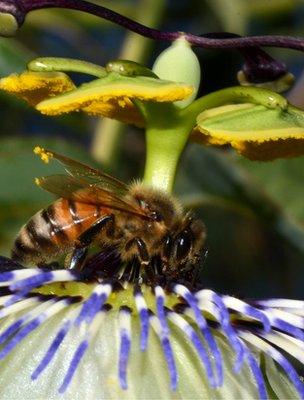Report: Earlier action can cut EU's environmental risks
- Published

Research has highlighted a possible link between the use of insecticide and falling bee numbers
Earlier action can help cut the impact of environmental threats in Europe but "bureaucratic silos" are causing delays, a report has suggested.
The European Environment Agency (EEA) assessment looks at how our current understanding of threat can be used more effectively to tackle new risks.
The report looks at a range of issues, such as pollution and invasive species.
It concludes by saying that more action at an earlier stage could help protect lives and the natural environment.
The report, Late Lessons from Early Warnings: Science, Precaution, Innovation, external, is the second volume produced by the EEA.
In 2001, the agency looked at the history of the precautionary principle between 1896 and 2000, external and looked at what lessons could be learned in terms of more effective decision making.
The latest publication looks at 20 case studies, including:
Lead in petrol
Water pollution
Smoking
Mercury pollution
Floods
Invasive species
Insecticides and honey bees
Biotechnology in agriculture
"It is hoped that this volume will enable communities and people to become more effective stakeholders and participants in the governance of innovation and economic activities in relation to the associated risks to humans and the planet," said EEA executive director Prof Jacqueline McGlade.
Precautionary principle
In its conclusion, the report's authors highlighted a number of areas that they felt could lead to a more effective and efficient decision-making process, adding that precautionary measures did not necessarily "stifle innovation" but could support it.
"Not only has the body of knowledge become richer since 2001, but the number of stakeholders involved in decision-making has become larger and more diverse.
"There has also been increasing attention to communicating scientific uncertainty, especially in the fields of climate change, food safety and emerging risk.
But they observed that there had been less progress in some areas: "Many of the political and scientific 'bureaucratic silos' still remain, despite frequent calls for policy integration and interdepartmental co-operation.
"It is therefore very important that large-scale emerging technologies... apply the precautionary principle based on the experiences and lessons learned."
They added that increases in scientific knowledge had shown that the links between stressors and harm were more complex than was previously thought.
"Much of the harm described in [the reports], such as cancers or species decline, is caused by several co-causal factors acting independently or together.
"[For example], Bee Colony Collapse can be linked to viruses, climate change and nicotinoid pesticides."
They also said that research had a tendency to focus on well documented hazards rather than investing more time and resources improving the scientific knowledge of emerging threats.
"Environmental and health research overly focuses on well-know rather than unknown hazards at the expense of emerging issues and their potential impacts," they concluded.
"Funding more holistic systems science would also help achieve a greater integration among the different branches of science and counteract problems such as: short-term interest outcompeting long-term vision; competition replacing co-operation ; fragmentation of information and knowledge.
- Published29 March 2012
- Published27 May 2012
- Published19 September 2012
- Published10 December 2012
- Published11 December 2012